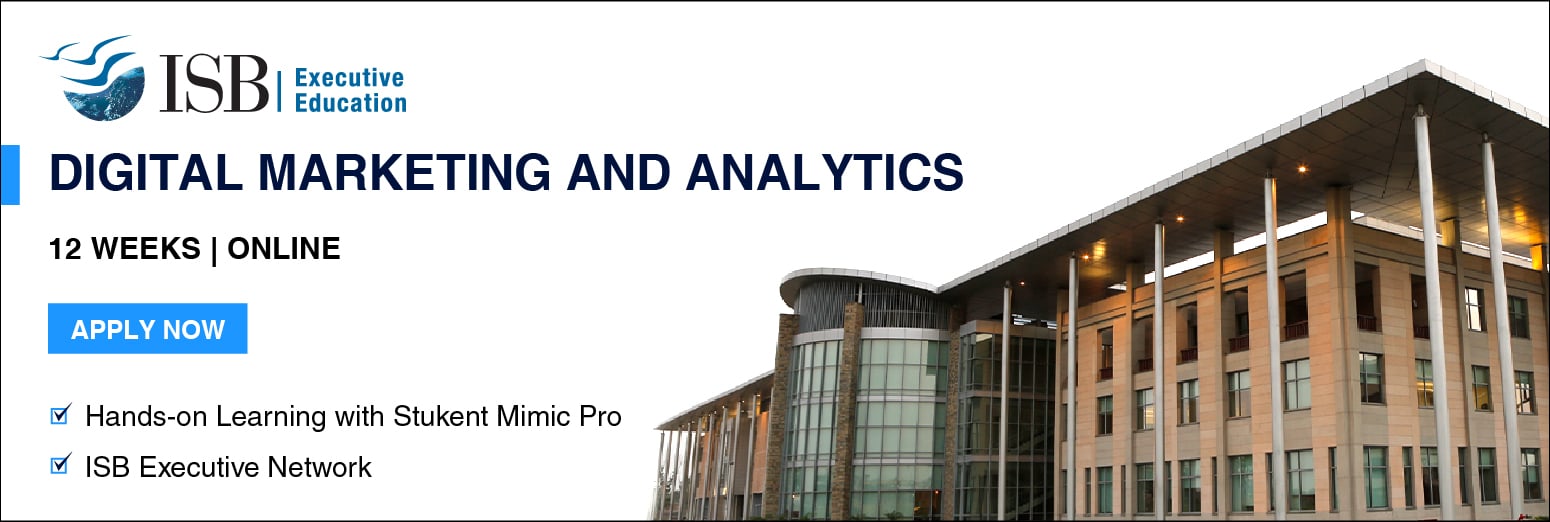The Ultimate Guide to 20 Digital Marketing Types for Aspiring Marketers

- 2. Pay-Per-Click (PPC) Marketing
- 3. Social Media Marketing (SMM)
- 4. Social Selling
- 5. Content Marketing
- 6. Email Marketing
- 7. Lead Generation
- 8. Digital Customer Service
- 9. Conversion Rate Optimization (CRO)
- 10. Mobile Marketing
- 11. Affiliate Marketing
- 12. Influencer Marketing
- 13. Programmatic Advertising
- 14. Marketing Automation
- 15. Web Analytics
- 16. Data Analysis
- 17. Website Designer or Developer
- 18. Branding and Identity
- 19. Graphic Design
- 20. Video Content Creation and Editing
- Ready to Learn Different Digital Marketing Types?
Delve into the digital marketing types—an industry that is brimming with opportunities. Picture it as a multifaceted playing field where discovering your niche is akin to unlocking a unique superpower. For context, Google processes an astounding 3.5 billion daily searches, showcasing the vast terrain marketers navigate. From mastering SEO to curating content and orchestrating social media strategies, this journey explores 20 captivating specializations. These areas empower professionals in the ever-evolving digital marketing arena.
In this blog, you will learn about the different digital market types:
- Search Engine Optimization (SEO)
- Pay-Per-Click (PPC) Marketing
- Social Media Marketing (SMM)
- Social Selling
- Content Marketing
- Email Marketing
- Lead Generation
- Digital Customer Service
- Conversion Rate Optimization
- Mobile Marketing
- Affiliate Marketing
- Influencer Marketing
- Programmatic Advertising
- Marketing Automation
- Web Analytics
- Data Analysis
- Website Designer or Developer
- Branding and Identity
- Graphic Design
- Video Content Creation and Editing
- Ready to Elevate Your Digital Marketing Expertise?
1. Search Engine Optimization (SEO)
SEO is the process of improving a website’s ability to achieve higher visibility and ranking on the search results. SEO aims to increase the number of organic visitors to a website by making it more visible and appealing to search engines.
You will need to possess the following skills to become an SEO expert:
Technical Skills
SEO technical skills include comprehension of the processes through which search engines “crawl” and “index” websites and familiarity with website architecture, HTML, and CSS.
Keyword Research Skills
An SEO specialist should be able to determine the right keywords to target based on the search intent, relevancy of those phrases, and search volume.
Content Creation and Optimization
Skills necessary for link building include the formulation of a plan for acquiring backlinks to a website. They should be able to evaluate the quality and relevance of the links acquired.
Link Building
It refers to the process of making other websites hyperlink your website on their content. Link building drives traffic to the site and increases your website’s authority.
Analytical Skills
Analyse website data, find areas for improvement, and track and report on Key Performance Indicators (KPIs) relevant to SEO.
Lifelong Learning
To become an SEO specialist, you must commit to lifelong education. Ensure that you are always updated on the most recent developments, trends, and changes in search engine algorithms.
2. Pay-Per-Click (PPC) Marketing
The second most digital marketing type is PPC marketing, which charges advertisers per clicked ad. It’s used on platforms like Facebook, Google, etc., to attract website visitors for potential sales or leads.
Research and Selection of Keywords
This step entails conducting research and selecting appropriate keywords to target. In your PPC campaigns, consider the keyword’s relevancy, search volume, and level of competition.
Copywriting for Advertisements
An effective PPC advertisement should be succinct, convincing, and relevant to the user’s search query or interests. An expert in PPC should be able to write advertising copy that satisfies these requirements.
Optimization of Landing Pages
A PPC specialist ought to have a working knowledge of User Experience (UX) and conversion optimization strategies to optimize landing pages and increase conversion rates.
Bid Placement Strategy
A PPC specialist should devise a strategy for placing bids that maximize the Return on Investment (ROI) for the advertiser. They must achieve high ROI on the advertiser’s budget.
Campaign Analysis and Optimization
A PPC specialist should be able to assess campaign data, identify areas for improvement, and make decisions accordingly.
Knowledge Unique to the Platform
A PPC specialist should be familiar with PPC advertising platforms. They should have working knowledge of the platform’s features, benefits, and best practices. This expertise is necessary to manage a PPC campaign effectively.
3. Social Media Marketing (SMM)
The technique of using social media platforms to advertise products or services, communicate with customers, and develop brand awareness is SMM. You will need to be proficient in the following areas if you want to become an expert in social media marketing:
Expertise in Social Media Platforms
A social media marketing specialist needs to be conversant with numerous social media platforms, such as Facebook, Twitter, Instagram, LinkedIn, Pinterest, and TikTok. They need to be aware of:
- The functionality of each platform
- The kind of content that gives high ROI for each network
- The methods for creating engaging social media posts
Content Development and Curation
The skills to create high-quality content optimized for each social media platform. This content can include images, photographs, videos, blog articles, and other content formats.
Community Management
Create a community of your users that you can use to nurture relationships. You can use the community to answer questions, interact with customers, offer loyalty program incentives, and steer the conversations to your advantage.
Social Media Advertising
Plan and manage advertising campaigns on social media. Platforms like Facebook and Google Ads offer laser-sharp targeting, making it easy to get the attention of the right target market. Social media ads offer a high ROI since you will find most of your customers lurking in at least one of the platforms.
Analytics and Reporting
Evaluate data from social media platforms to recognize patterns, monitor KPIs, and generate reports on the effectiveness of social media campaigns.
Creativity
A social media marketing specialist should be able to come up with new ideas for social media content and campaigns, as well as adapt to the always-shifting landscape of social media.
4. Social Selling
Social selling is developing relationships with prospective clients through social media to offer your services. Here are some of the skills required to achieve mastery in social selling:
Social Media Expertise
Social selling leverages platforms like Facebook, Twitter, LinkedIn, Instagram, TikTok, Pinterest, marketplaces, and apps to engage prospects effectively.
Sales Skills
You need to be familiar with the sales process, know how to close deals, handle objections, and maintain customer relationships.
Content Creation
Create content that is not just informational but also beneficial to the audience you are trying to reach. It could be in the form of blog posts, infographics, films, or posts on various social media platforms.
Data Analysis Skills
You should be able to measure the performance of your social media campaigns. Analyze the data to optimize your strategy. It requires familiarity with analytics tools and the capacity to analyze data to recognize patterns and trends.
Communication and Relationship-Building
Clear client communication, relationship-building, and resonant messaging within your target audience build reputation, trust, and credibility and foster meaningful relationships.
Curiosity and the Ability to Adapt
Due to the evolving nature of social media, marketing tactics for the same must be dynamic. Success in social media requires curiosity, learning, and flexibility—embracing trends, tools, and strategy shifts for effective social marketing.
5. Content Marketing
Content marketing is another digital marketing type that involves crafting valuable and consistent material. The objective is to engage a specific audience and drive profitable consumer action. It aims to establish brand authority, build trust, and boost sales through informative content. Expertise requires proficiency in multiple areas, such as:
Content Creation
It is the ability to develop high-quality, entertaining, and instructive material in a variety of formats. Content types include blog posts, articles, videos, infographics, and e-books, and is an essential skill for a content marketing specialist.
Content Strategy
Establish a content strategy for the organization in line with its business goals, target audience, and brand voice. Also, develop the ability to plan the process of content creation and delivery.
Search Engine Optimization (SEO)
Be knowledgeable about the best practices of SEO and optimize content for search engines. This includes conducting keyword research, optimizing on-page content, and building backlinks.
Social Media Marketing
Use social media platforms to share and promote material, interact with the target audience, and raise brand awareness.
Analytics and Reporting
Analyze content from social media platforms and tools like Google Analytics to recognize patterns, track KPIs, and report on content performance.
Creative Writing
The ability to write well, adapt the business’s voice to various content formats, and target consumers is pivotal.
Project Management
Be capable of managing several content projects and deadlines, working together effectively with team members, and successfully prioritizing assignments.
6. Email Marketing
Email marketing involves using emails to connect with potential and current customers, fostering relationships, promoting products, and boosting conversions. It aims to provide valuable content, encouraging actions like purchases or referrals.
Email Marketing Software
Familiarity with email marketing software like Mailchimp, Constant Contact, Convertkit, or Campaign Monitor, and the skills to use it to build and manage email campaigns.
Email Copywriting
Write intriguing and engaging email copy that keeps subscribers interested and inspires them to take action.
Email Design
Design visually appealing, responsive, and optimized emails for various email clients and devices.
List Creation and Segmentation
Build an email list and segment it using filters such as interests, behavior, or demographics. Utilize the segmentation to tailor the content of the emails you send to subscribers.
A/B Testing and Optimization
Do A/B tests on various email features, including subject lines, text, and call-to-action buttons. Use the results of those tests to optimize the performance of your emails.
Analytics and Reporting
Develop the skills to analyze email data to recognize patterns, track KPIs, and report on your email campaign’s performance.
Legal Compliance
An email marketing expert should know the laws and regulations pertaining to email marketing, such as the CAN-SPAM Act. , They must ensure that all email marketing campaigns adhere to these guidelines.
7. Lead Generation
Lead generation is finding and developing prospective clients for an organization. Here are some of the skills that are required to become an expert in lead generation:
Building a Sales Funnel
Lead generation requires skills such as email marketing, social media marketing, SEO, PPC, and content marketing to build a sales funnel that captures leads and nurtures them to become customers.
Competence in Sales
Lead generation puts you in front of prospective customers who can be closed with ease. An understanding of sales techniques is vital. Proficiency entails knowing the sales process, identifying prospects, and nurturing client connections for conversions.
Data Analysis Skills
The ability to interpret data from multiple sources helps you understand the needs and preferences of your leads. This helps you generate the right kind of leads.
Research Skills
Generating leads demands research. Know your target audience, find them, understand their needs, and craft resonant messages.
Creativity
Amid fierce competition, creativity is vital for standing out and attracting leads. Innovative thinking is crucial to engaging potential clients effectively. A quirky microcopy or a brilliant visual can turn a casual message into a lead-generating machine.
8. Digital Customer Service
Digital customer service assists clients through online mediums like email, chat, and social media. Crucial skills include communication, empathy, problem-solving, and adaptability for effective customer interaction.
Proficiency With Digital Platforms
An expert in digital customer service should have expertise in digital channels, including email, social media, chat, and messaging apps.
Competence in Problem-Solving
A digital customer service expert should be able to swiftly recognize and resolve any issues or problems that may arise with customers.
Empathy and Patience
A digital customer care professional must have a high level of empathy and patience to cope with upset or frustrated consumers.
Becoming an expert in digital customer care requires excellent communication skills, technological proficiency, the capacity to solve problems, and a passion for customer service.
Attention to Detail
A digital customer care professional should have strong attention to detail and capture customer interactions and problems accurately.
Technical Proficiency
A digital customer care specialist should be able to diagnose fundamental software and hardware problems, among other basic technical abilities.
Time Management
A digital customer service specialist should be able to manage their time to respond to customer inquiries promptly and effectively.
Ability to Manage Many Tasks at Once
A digital customer care professional should be able to multitask and handle multiple consumer questions concurrently across various digital channels.
9. Conversion Rate Optimization (CRO)
CRO enhances website, landing page, or email campaign performance by increasing the rate of desired actions like purchases or sign-ups. It aims to remove barriers, improve user experience, and boost sales.
Data Analysis
Collect and analyze data from Google Analytics, heatmaps, user recordings, and surveys. Use the insights to determine conversion barriers and possibilities.
User Experience (UX) Design Skills
Be familiar with UX best practices to design and implement changes that improve the user experience. These changes include reducing page load times, simplifying navigation, and improving mobile responsiveness.
A/B Testing and Experimentation
To validate hypotheses and improve conversion rates, a CRO expert needs to be able to plan and carry out A/B tests and experiments.
Web Development
Basic skills in web development to implement changes to websites and landing pages, such as adding or removing elements, changing colors or font sizes, and improving form or checkout processes.
Copywriting and Visual Design
They must have a basic understanding of copywriting and visual design. The ability to produce and edit content that enhances the user experience and boosts conversions is also crucial.
Project Management
Be capable of managing several CRO projects and deadlines, delegating tasks, collaborating with team members, and efficiently prioritizing assignments.
10. Mobile Marketing
Mobile marketing is a facet of digital marketing type centered on customer engagement via mobile devices. Techniques like mobile ads, optimized sites, apps, texts, and push notifications are pivotal for effective execution.
Mobile App Development
Knowledge of how to create, design, and maximize the performance of mobile applications on platforms like iOS and Android.
Mobile Advertising
Knowledge of how to build and manage mobile ad campaigns, including display ads, in-app ads, and mobile video ads, by utilizing platforms such as Google Ads and Facebook Ads.
Mobile Analytics
Knowledge of the tools and techniques of mobile analytics to track and measure mobile campaign performance is important. Determine areas to improve and make decisions based on data.
User Experience (UX) Design
Knowledge of user experience design principles and best practices to develop mobile applications and websites. They should be user-friendly, engaging, and optimized for use on mobile devices.
SMS and Push Marketing
Knowing how to plan and implement targeted SMS and push notification campaigns is a must-have skill. They should be relevant and compliant with the government’s regulations.
Mobile SEO
Knowledge of the best practices for mobile SEO is crucial to get decent results. It includes optimizing content for mobile devices and local search and ensuring mobile-friendly website design.
Mobile Content Creation
This competency includes creating compelling and engaging mobile-friendly blog posts, social media content, and video content optimized for mobile devices.
11. Affiliate Marketing
Affiliate marketing is performance-based, with businesses rewarding affiliates for attracting new clients through their marketing efforts. Affiliates use diverse channels like websites and social media handles. Expertise in affiliate marketing demands tech, marketing, and networking skills. Crucially, it involves identifying networks and affiliating with bloggers, influencers, and creators. Here are some of the most important skills needed for affiliate marketing:
Affiliate Network Management
This is the ability to track affiliate performance, manage rewards, and optimize affiliate program performance using various tools and approaches.
Affiliate Program Management
The ability to create high-quality and engaging content, such as product reviews, blog posts, and social media content, that resonates with target audiences and drives traffic and conversions. Examples of this type of content include social media posts, blog posts, and product reviews.
Content Creation
Understanding data analysis tools and techniques to analyze and measure the affiliate marketing programs’ performance. Data analysis shows you areas to improve based on the reports generated and make decisions based on the collected data.
Data Analysis
Knowledge of numerous digital marketing channels, like SEO, PPC, and SMM. The ability to incorporate these channels into an affiliate marketing plan is also crucial.
Digital Marketing Skills
The ability to create and maintain good relationships with affiliates, draft partnership agreements, and provide continuing assistance is a part of affiliate relationship management.
Relationship-Building
Knowledge of sales and marketing principles and tactics, including identifying target groups, creating successful messaging, and driving conversions.
Sales and Marketing
Successful affiliate marketers also exhibit adaptability, creativity, and a strong spirit of entrepreneurship in their business practices. Maintaining current knowledge of the most recent industry trends, tools, and recommended practices is essential to success.
12. Influencer Marketing
Influencer marketing entails partnering with prominent social media figures with engaged audiences to promote brands or products. Also called partnership marketing, it aims for enhanced brand awareness, sales, and ROI by leveraging influencers’ reach, credibility, and impact. Success in influencer marketing requires the following skills.
Strategic Thinking
A successful influencer marketer must be able to design a clear and effective plan for working with influencers.
Relationship Building
Influencer marketing is all about developing strong relationships with influencers, so it is necessary to have great relationship-building abilities if you want to be successful at it.
Communication Skills
Influencer marketers need effective communication skills to communicate clearly with influencers and manage expectations.
Creativity
This is an essential skill for successful influencer marketers because they need to build innovative and engaging campaigns that resonate with their target audience and are in alignment with the brand’s values and messaging.
Data Analysis
Influencer marketers need to have a solid skill set in data analysis to measure the performance of their campaigns. It helps them identify areas to improve and make decisions based on the data collected.
Project Management
Strong project management skills are required since influencer marketing campaigns include coordinating various parties and the execution of complex projects.
Flexibility and Adaptability
Influencer marketing is a subject that is continually changing. It is essential to have the flexibility and agility to adjust to new circumstances and directions quickly.
Knowledge of the Industry
To be successful in digital marketing, you must have a comprehensive understanding of social media and influencer marketing.
13. Programmatic Advertising
Programmatic advertising employs automated software to acquire and optimize real-time ad inventory, using algorithms and machine learning to decide what, when, and to whom to display ads. Mastery of this requires tech and analytical proficiency. Vital skills include:
Data Analysis
Collect, analyze, and interpret data from website analytics, audience data, and ad performance metrics to make programmatic advertising decisions.
Ad Tech Platforms
Knowledge of ad tech platforms, such as Demand-Side Platforms (DSPs), Supply-Side Platforms (SSPs), and Data Management Platforms (DMPs), and an understanding of how these platforms interface with one another and the larger advertising ecosystem.
Real-Time Bidding
Understanding of programmatic advertising tactics such as Real-Time Bidding (RTB), audience targeting, Dynamic Creative Optimization (DCO), and the ability to build and run successful campaigns.
Ad Creative Development
Ability to produce high-quality ads and creatives, such as display advertisements, video ads, and native ads, that appeal to target audiences and drive engagement and conversions.
Industry Trends and Best Practices
Staying abreast of the most recent industry trends and best practices, such as changes in regulations, developing ad formats, and how these factors affect programmatic advertising.
Good Communication and Teamwork Skills
Work effectively with stakeholders, such as clients, agencies, and technology partners, to successfully negotiate deals and manage conflicts.
14. Marketing Automation
Marketing automation refers to the use of software and other forms of technology to automate and simplify routine marketing processes. In the realm of online marketing, marketing automation has the potential to fulfill several functions, including.
Lead Generation
Marketing automation software can be used to capture and qualify leads by automating operations. Email campaigns, social media interactions, and landing page optimization help with lead generation.
Lead Nurturing
Marketing automation can help nurture leads by providing individualized content and communications. This can include targeted email campaigns, triggered messaging, and dynamic website content, among other things.
Customer Segmentation
Marketers may use marketing automation to segment customers based on demographic and behavioral data. It helps them build campaigns that are more focused and individualized to each customer.
Campaign Management
Marketing automation can make the process of planning, executing, and measuring marketing campaigns easy. Channels like email, social media, and PPC can be made more streamlined and efficient.
Data Analysis and Reporting
Marketing automation software offers in-depth analytics and reports on the efficacy of campaigns. It enables marketers to assess their progress over time and improve the effectiveness of their work.
15. Web Analytics
Web analytics monitors website performance and user actions for insights on interaction and functionality, improving user experience and marketing campaigns. You will need to be proficient in the following areas if you want to become an authority on web analytics:
Web Analytics Tools
A thorough comprehension of the data provided by web analytics tools like Google Analytics, Mixpanel, and Kissmetrics is necessary.
Data Analysis
The ability to collect, clean, analyze, and interpret vast amounts of data to deliver useful insights to stakeholders.
Create Reports and Dashboards
The ability to develop individualized reports and dashboards that are geared to meet specific requirements of various stakeholders.
Expertise in Statistical Analysis
Be able to employ statistical tools to evaluate and interpret data from websites.
Technical Skills
A fundamental understanding of HTML, JavaScript, and related web development technologies.
Communication Skills
Effectively convey and present data to various stakeholders, including management, clients, and technical teams.
Business Competence
A profound comprehension of the objectives of the organization and the ability to align data insights with these goals.
16. Data Analysis
Data analysis in digital marketing type helps comprehend the audience, customize campaigns, gauge effectiveness, and refine strategies. Essential skills include statistical proficiency, software skills, and strategic thinking for optimal marketing outcomes.
Here is a list of some of the most important functions that data analysis performs in digital marketing:
Audience Segmentation
Marketers must design marketing campaigns that are more focused on customer behavior and demographics. As a result, these campaigns have a greater chance of resonating with the audiences they are trying to reach.
Campaign Optimization
Marketers must track and analyze data on campaign performance. This allows them to optimize their campaigns to maximize return on investment.
A/B Testing
This method contrasts the success of two distinct iterations of a marketing campaign or website. Data analysis is necessary to determine which variation is successful and adjust the campaign accordingly.
Predictive Analytics
It uses data and machine learning algorithms to predict customer behavior and customize your marketing efforts to fit customers’ wants and preferences better.
17. Website Designer or Developer
A website designer or developer is a professional capable of designing, developing, and maintaining websites. Web designers and developers are the ones who are responsible for developing the overall look and feel of a website. The site’s functionality and technical components are also handled by them.
You will need to be proficient in the following areas if you want to work as a website designer or developer:
HTML & CSS
The building blocks of web development include a markup language called Hypertext Markup Language (HTML) and a style sheet language called Cascading Style Sheets (CSS). To be capable of creating and styling web pages, you should have a solid command of both HTML and CSS.
JavaScript
Knowledge of this programming language can be used to provide interactivity and dynamic elements to websites, in addition to the many libraries and frameworks it comes with.
Web Development Frameworks
Web development frameworks like React, Angular, or Vue can assist in building complicated online applications. At a minimum, you should have experience working with web development frameworks.
Design Tools
If you want to be able to develop design mockups and wireframes, you should have a working knowledge of design programs like Adobe Photoshop and Sketch.
User Experience Design
UX design is the process of developing a website that is simple to use and navigate. You need to have a solid understanding of UX best practices and the ability to design a website that is easy to navigate.
Accessibility Best Practices
Accessibility on the web refers to developing websites easily accessible by differently-abled individuals. You should be familiar with the principles of online accessibility and develop websites that are accessible to all users.
Content Management Systems (CMS)
CMS like WordPress or Drupal aids swift website creation. Prior CMS experience is valuable for efficient site management.
SEO
You must have a fundamental comprehension of SEO best practices and be able to implement them in the website development projects that you work on.
Project Management Skills
Web creators manage tasks, coordinate, benefit from coding program courses, gain expertise through internships, and stay updated for successful outcomes.
18. Branding and Identity
Mastering branding and identity in digital marketing involves crafting a unique brand image, personality, and visual style using logos, slogans, and values. Expertise in design, psychology, market analysis, and communication is vital for conveying a brand’s message and gaining a competitive edge.
Consumer Psychology
To become an authority on branding, you need extensive knowledge of consumer psychology, market research, and brand strategy.
Communication and Collaboration Skills
Outstanding communication and collaboration skills will help you interact with various departments and stakeholders.
Creative Talent
You also need strong creative talents, including the ability to develop captivating visual and written material.
Solid Design Background
You must have a solid design background, with graphic design, typography, and color theory skills, to become an identity design expert.
Design Software Skills
Expertise working with design software such as Adobe Creative Suite and others.
19. Graphic Design
Graphic design is the art of generating visual content to convey information, ideas, or feelings to a target audience. This can include logos, branding elements, packaging, website design, etc..
The following are some of the most important skills needed to become an expert in graphic design:
Competence With Design Software
Designers need Adobe Creative Suite skills, including Photoshop, Illustrator, InDesign, and potential knowledge of Sketch or Figma for added advantages.
Typography and Layout
Graphic designers must have knowledge of typography, layout, hierarchy, balance, and contrast for effective message transmission through visual elements.
Color Theory
Color theory knowledge is crucial for functional, designs. Graphic designers must adeptly employ color to convey messages, and emotions, and set an ambiance.
Communication and Collaboration
Graphic designers must adeptly liaise with clients, colleagues, and other stakeholders like marketers, developers, and writers.
Creativity
Graphic designers must have high creativity to develop original and effective design ideas that can successfully become a concept.
Attention to Detail
Attention to detail is essential for graphic designers, as it helps them create error-free and flawless designs.
Time Management
To achieve the deadlines set for projects, graphic designers need to be able to manage their own time efficiently.
20. Video Content Creation and Editing
Video content is becoming increasingly popular on social media platforms; content production and editing are skills required for video marketing and promotional objectives.
Here are some of the skills required to become an expert in the development of video content:
Skill in Video Production
To create video content of high quality, you must understand lighting, sound, camera operating, and framing the shot. This requires technical knowledge of video production, like adjusting camera settings, capturing the audio, and setting up the lighting.
Skills in Video Editing
Familiarity with tools like Adobe Premiere Pro, Final Cut Pro, or DaVinci Resolve is crucial. Video editing skills such as transitions, trimming, music, sound effects, and special effects enhance film quality.
Scriptwriting Skills
Generating video content necessitates an engaging, concise script that effectively conveys the message while captivating the audience.
Storytelling Skills
Video success hinges on resonant storytelling. Craft ideas, script, and storyboard to breathe life into compelling narratives.
Communication Skills
Strong communication skills are vital for video creation to convey the right messages. Ensure clear and fluent interaction with clients, colleagues, and team members for desired results.
Creativity
A creative mindset is required to produce interesting video content. You must think creatively and come up with fresh and original concepts that can captivate the audience’s interest.
Ready to Learn Different Digital Marketing Types?
Enhance your skills through Emeritus’ digital marketing course, designed to get you industry-ready. Gain mastery across various digital marketing types and maintain a competitive edge in the online landscape. Opt for Emeritus to access comprehensive and impactful learning in this ever-evolving domain.
Write to us at content@emeritus.org






